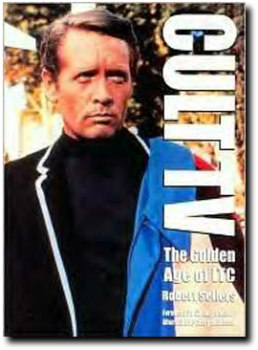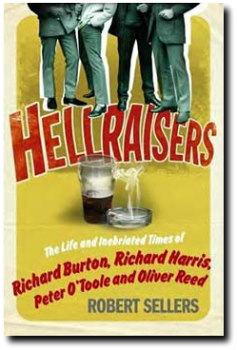
HOMEWesley Britton’s Books,
|
Spies on FilmSpies on Television & RadioSpies in History & LiteratureThe James Bond Files |
|
The James Bond Files ~ Beyond Thunderball
– Robert Sellers Talks about Bond and Other Brits
By Wesley Britton 
For Bond fans, the publishing event of 2007 was Robert Sellers’ The Battle for Bond: The Genesis of Cinema’s Greatest Hero (Tomahawk Press). The year before, his Cult TV: The Golden Age of ITC (Plexus Publishing) was the first comprehensive exploration of the most influential decade in British TV spies. During the months before and after Battle for Bond debuted, I read a number of interviews with Robert and noticed most, naturally, dealt with the book’s revelations about the film creation of 007 and the legal duels between EON and Kevin McClory. I wondered – what did Sellers think about the literary James Bond, the work of author Len Deighton, the Roger Moore outings, and the influence of Sean Connery on British TV? I wondered what he thought makes the Bond series special and his thoughts about the future of 007. Below are Robert’s answers to my questions with fresh, informed insights into the James Bond mythos. Expect some surprises from a Bond fan who doesn’t like Ian Fleming. Q – I understand your interest in Bond is the movies, not the books. Have you read any of the novels and what do you think of those you’ve looked at? I must confess to not being a literary Bond fan. My first exposure to Bond as a kid, like most people, were the films, and when I went to have a look at the books and tried diligently to read them aged something like 10 was slightly put off. They are, let’s face it, a bit slow and terribly old-fashioned. I see them more as cultural history rather than thrillers, opening up an aperture on a lost golden age, of playboys driving Bentleys along the seafront at Nice and grand meals in the best restaurants in 1950s New York. I always loved Fleming’s descriptive passages about food and wine and enjoyed his sadistic turn of phrase, but the lack of humour in his prose was death for me, particularly since the films scored so highly in self-deprecating comedy. I just found Fleming took himself too seriously. Actually during my research for my book Battle for Bond, I found Fleming to be far more humorous in his private letters than he ever afforded his Bond character. Q – You got to know author Len Deighton while working on Battle for Bond. Have you read anything by him? Any thoughts on the Michael Caine “Harry Palmer” films? Along with The Spy Who Came in from the Cold, The Ipcress File is the best serious spy film ever made. No, I haven’t read any of Deighton’s work, and thank God he didn’t ask me any questions about them when we met. You see, I don’t actually read fiction; I’m much more likely to want to read a biography on Deighton himself. My reading material is film books, biographies and history. I just don’t read fiction. Q – I’m with you putting Thunderball at the top of your favourites list. I admit being surprised to see You Only Live Twice as your Number Two. What about that film do you like? I’ve always thought it the weakest Connery outing with so many plot holes. 
I agree; Connery walks through that film as if in a coma. It’s without doubt his poorest performance as Bond, and the plot makes no sense whatsoever – but who cares, You Only Live Twice isn’t about Sean Connery – this is Ken Adam’s Bond film. That volcano is the greatest film set ever; I could sit and marvel at every inch of it, every piece of stainless steel or lava outcrop, for hours. It’s just breathtaking. And the battle climax is the Lawrence of Arabia of action sequences. The shot of the ninjas careering down those ropes is iconic. If Bergman had shot that scene, it would now be regarded as a piece of art. Q – I’m also with you ranking On Her Majesty’s Secret Service so highly. What about it makes it one of the best for you? For me, just like Thunderball, OHMSS mixes the best elements of Fleming’s writing with the best elements of the film series, great supporting actors, luscious location filming and lashings of 60s style. That whole period, from Thunderball running through You Only Live Twice and ending with OHMSS was Bond’s artistic peak. It can’t be touched. Q – The only Roger Moore in your top five is The Spy Who Loved Me, one of Moore’s favourites as well. Someone once said Sir Roger’s 007 was simply The Saint with an expense account. Is that a fair summation of the Moore era? I think that’s very unfair. I used to have a downer on Roger because I was such a Connery fan, but when you look at the candidates in the early 70s to take over the Bond role, really there wasn’t anybody else to touch Roger, and I think he did a great job. He’ll always be my second favourite Bond after Connery. Q – You don’t think there were any bad Bond films. Well, which would rate at the bottom end of the spectrum? Why? The thing with the Bonds, I can stick any of them on and be entertained. But if you must put a gun against my head, I’d offer A View to a Kill as the worst of the lot. Its cardinal sin being that it’s a tad boring at times. Walken and Grace Jones are great villains, there’s some good action and stunts, the fire in City Hall is terrific, but Tanya Roberts’ character is very weak and dear old Roger is really looking his age in this one. Q – Many think director Terence Young was the most important figure shaping the screen James Bond. Any merit to this claim? Absolutely, most people I’ve spoken to who worked on the Bond films point to Young as perhaps the overall influence on the eventual style of the films. It was great good fortune that Broccoli and Saltzman hired him; after all he wasn’t their first choice. Young was very much from the same kind of background as Fleming, a bit of a snob, a bon vivant, and like Fleming, wanted to be James Bond himself, I’ve been told. So just like Fleming used Bond on the written page to live out a voyeuristic fantasy, I think Young projected his personal image, through Sean’s performance, onto the screen. Q – What would you say Kevin McClory’s influence was on the first three Bond films – if any? Does he get credit, in your mind, for Blofeld and SPECTRE? Well, McClory was responsible for the first ever Bond screenplay, Thunderball, back in 1959. He hired Jack Whittingham to come in and re-write Fleming’s miserable early efforts. Plus there’s speculation that when Richard Maibaum began writing Dr. No, he saw that script, so just how much of McClory/Whittingham’s ideas and concepts of Bond as a screen character influenced him, who knows. SPECTRE was also invented for that first Bond script. Q – Do you think new Bond films would benefit from having an ongoing adversary like Connery had battling Blofeld and his SPECTRE operatives for virtually every film in his run? Absolutely, I think that’s what makes the Connery films special. That he’s up against the same bunch of lunatics each time and in that way we get those immortal lines such as, ‘we meet again Mr Bond.’ The Moore films lose out on that, there’s no continuity to them in that way. I’d also like the Daniel Craig films to go more way out fantasy-wise. I loved what they did with Casino Royale, but I know I’d get a real kick out of seeing Craig as Bond underwater dodging sharks or skiing off mountains. That’s the beauty of Bond, you can do a Graham Greene type spy movie, a la From Russia With Love and that works or go way out with Moonraker and it still works. That’s what makes Bond as a character totally unique. Q – To me, one of the things that gave Thunderball its depth was that we were able to see the size of the organization Bond was up against – and we got this as well in From Russia With Love. Was this something you saw in the two movies? Absolutely, again it’s that continuity we have in the Connery films. Each time he faces SPECTRE we know he’s up against a mighty force, whereas in the Moore films, it’s a new villain each time and one doesn’t get that same sense of foreboding. The Man With The Golden Gun, for example, Scaramanga’s got a midget and a janitor making up his army. My granny could have finished off that lot. Q – You clearly have considerable respect for how EON shaped the early 007 films. Over the years, what were their best choices, what were there least successful missteps? Writing The Battle for Bond, one thing was obvious to me, thank God Kevin McClory never got his hands on the Bond films. I really believe that only the combined talents of Broccoli and Saltzman could have made the Bond films into the success they were. I think, however, that later on in the series they missed a trick not hiring any American directors. I don’t know why they have this policy of not using Americans. If they get a non-Brit he’s usually from New Zealand or something. I don’t understand it. Spielberg wanted to direct a Bond film and they turned him down. Why!!! Although to be fair to Eon, Irvin Kershner’s American and look what he did with Never Say Never Again. Q – It’s been reported that when EON was looking for their first Bonds, Patrick McGoohan was in the list of contenders. Did you run across this in your research? Considering his dislike for guns and onscreen romances, it’s difficult to see him make the transition from Drake to 007. I gather Saint producers dropped him as a possible Simon Templar because of this. This is quite right; McGoohan apparently turned the Bond role down twice, on moral grounds. In my ITC book, people told me that McGoohan influenced the Danger Man scripts, in that his character rarely if ever carried a gun and never indulged in romance with his leading lady. It was this almost puritanical policy that was also behind his reasons for turning down The Saint; he was Lew Grade’s first choice for Simon Templar. Amazing, isn’t it, here is a man who could have been both James Bond and The Saint. But then, had he done them, there would have been no Prisoner. Q – Speaking of McGoohan, you say in your book on Sir Lew Grade’s ITC British series that one theory behind The Prisoner’s creation is that the actor was responding to the demands of Danger Man – that he was a prisoner of his series. Any merit to this theory in your opinion? It’s a story that Peter Graham Scott, who directed a Prisoner episode, told me so I guess because he was there and maybe probed McGoohan’s mind a bit during shooting, he should know. It makes sense, too. It must have been like working in a factory churning out episode after episode of Danger Man. According to Scott, McGoohan would sometimes spend all night at the studio, away from his family. Maybe he felt imprisoned by the sheer daily grind of producing that series, and that’s one of the things he wanted to express with The Prisoner. 
Q – What non-Bond spy films and/or TV spy series do you think are nuggets worth more attention and viewing? For example, I gather you are a fan of The Persuaders, The Champions, and shows barely known in the States like The Baron and Jason King. I’m a huge ITC fan, I just love all those shows, but perhaps my all-time favourite TV series (spy and non-spy) is The Avengers, god that’s brilliant. It was so smart, so cool, and Diana Rigg was gorgeous. I remember many years ago I was in Harrods and I looked round and there she was. Alas I was too timid back then to say anything – I bloody would now. Q – You have two books currently in the pipeline – what do you want readers to know about them? Both are Bond related but I don’t want to spill the beans on them, although I can reveal that they are on subjects hitherto not written about before. I’ve also been working with Vic Armstrong on his official film memoirs. My latest book comes out in May (June in the US) [2008] and is called Hellraisers and is about the drunken exploits of Richard Burton, Richard Harris, Peter O’Toole and Oliver Reed. Robert Sellers’ many books, including The Battle for Bond: The Genesis of Cinema’s Greatest Hero, Cult TV, and Hellraisers, are available in bookstores everywhere, as well as these on-line merchants ~
Tomahawk Press
|